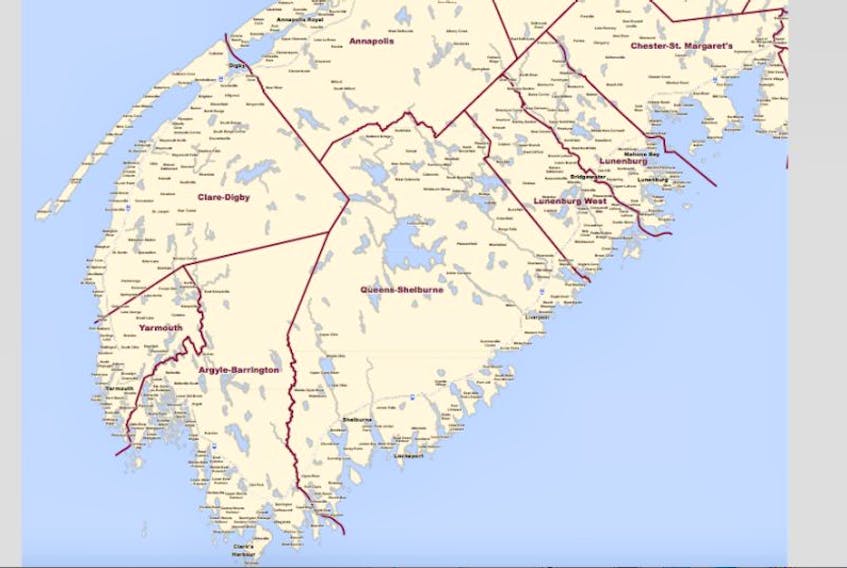This comes years after protected ridings, as they were called, in the province were eliminated, replaced with ridings based on population instead. Earlier this year the court ruled eliminating those ridings so was unconstitutional.
This week the independent Commission on Effective Electoral Representation of Acadian and African Nova Scotians is starting to hold public engagement sessions in communities across the province.
The first meeting is at 6:30 p.m. on Sept. 11, at the Black Loyalist Heritage Centre, 119 Old Birchtown Rd.
Other meetings this week are:
• 6:30 p.m., Sept. 12 in Clare at the Salle des anciens combattants de Clare, 9938, Route 1, Saulnierville
• 6:30 p.m. Sept. 13,Centre communautaire de Par-en-Bas, Salle Maurice LeBlanc, 4258, route 308, Tusket
• 6:30 p.m. Sept. 14, Digby Regional High School, 107 King St, Digby
There are 13 public engagement sessions in total that will wrap up on Oct. 4. Other meeting locations are Preston, Halifax, Richmond, Cheticamp, Whitney Pier, Sunnyville, New Glasgow and Dartmouth.
The commission will present a report to the government by Nov. 1. There won’t be any changes made at this time as a result of this commission. Its report and recommendations will inform the next Electoral Boundaries Commission that is expected to be established by government early in the new year.
“The commission is dedicated to engaging with Acadians and African Nova Scotians, actively listening, reflecting, and then providing our best advice on effective electoral representation,” said commission chair Doug Keefe.
In January, Nova Scotia’s Court of Appeal ruled that changes made to the province’s electoral map as a result of a 2012 electoral boundaries review violated Section 3 of the Canadian Charter of Rights and Freedoms. New boundaries struck by the then-NDP government eliminated three protected Acadian ridings in the province – Argyle, Clare and Richmond – and also eliminated an African Nova Scotian riding.
COURT CHALLENGE
The Federation Acadienne de la Nouvelle Ecosse challenged this in court, arguing the removal of protected ridings took away Acadians’ voice in the Legislature since the protected minority ridings had given Acadians a greater ability to elect Acadian MLAs.
Although the court’s ruling came months before the last provincial election, the boundaries established from the 2012 review remained in place during that vote. The Liberal government announced prior to its May 31 election call that a commission would revisit the issue of Acadian and African Nova Scotia representation. The government had also said there wasn’t time to review the boundaries ahead of a 2017 election.
Back in 2012, an electoral boundaries commission had recommended eliminating the stand-alone riding of Yarmouth and dividing the riding in half to merge it with the Argyle riding on one side and the Clare riding on the other. That recommendation didn’t sit well. Around 2,500 people turned out for a meeting at the Mariners Centre in Yarmouth demanding that the Yarmouth riding remain intact. At meetings in Argyle and Clare there were calls not to eliminate these protected Acadian ridings.
The review process back then was not without controversy, when then-Justice Minister Ross Landry rejected a first interim report of the commission that has recommended maintaining the Acadian ridings. Landry said the commission had not followed the terms of reference and the population thresholds outlined in them. Others saw it as interference in an independent process.
Eventually, at the end of the process and three commission reports, it was the riding of Shelburne that saw itself divided into an Argyle-Barrington riding and a Queens-Shelburne riding. Needless to say that decision didn’t sit well in Shelburne, especially considering that an earlier recommendation of the commission had been not to change the Shelburne riding.
Although the current-day commission is tasked with the issue of representation for Acadian and African Nova Scotians, it’s likely commission members will hear from those displeased with the division of the Shelburne riding as well.
The Clare Acadian riding, meanwhile, was merged into a Clare-Digby riding.
“In addition to what needs improvement, we want to hear what is working,” said Keefe. “We want to build on successes, positive approaches, and examples of effective representation of all kinds.”
Keefe is an independent consultant and former deputy minister of Justice with the Province of Nova Scotia. He is joined on the commission by Sharon Davis-Murdoch and Kenneth Deveau.
Davis-Murdoch is co-president of the Health Association of African Canadians and the health lead for the Local Immigrant Partnership. Deveau is a vice-president at Université Sainte-Anne, who has done extensive research on the vitality of Acadian and francophone minority communities in Canada and has authored more than 40 publications on the subject.
Commission’s role and report
In its report, the Commission will make recommendations to the province on how best to achieve effective representation for Acadian and African Nova Scotians. The Commission has no mandate regarding electoral boundaries, but it may comment on the desirability of using riding boundaries as a vehicle for effective representation. The final report and recommendations will inform the next Electoral Boundaries Commission, which will be established by the provincial legislature by Jan. 31, 2018.
Have your say
In addition to the public meetings, anyone interested in participating can submit a brief or comments directly to the commission:
• By email: [email protected]
• By mail: Commission on Effective Electoral Representation for Acadian and African Nova Scotians,
P.O. Box 2125, Stn Central, Halifax, NS B3J 3B7
• Leave a message at the toll-free number: 1-844-868-0233.
• Make a comment on the commission’s Facebook page.









